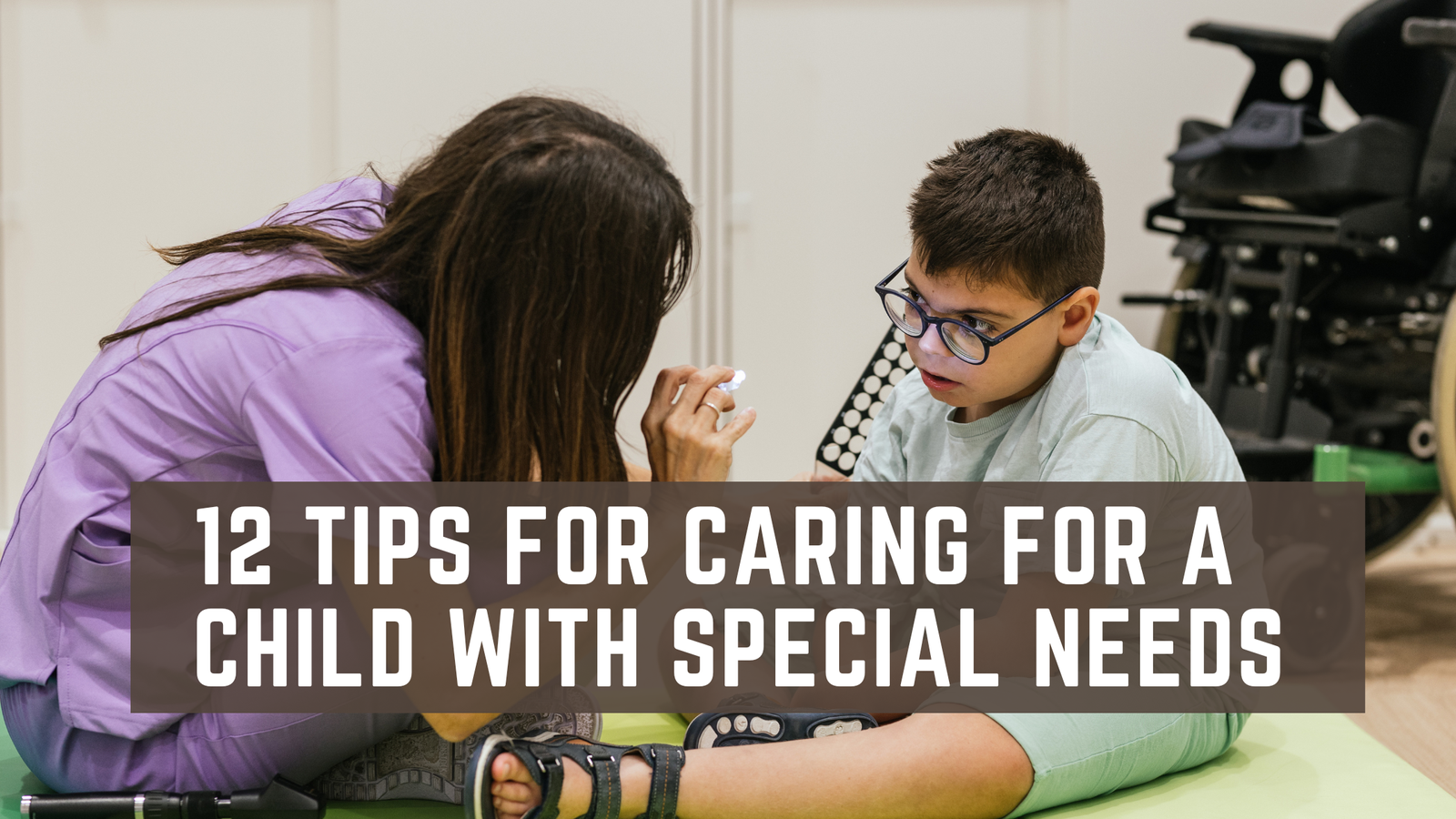Caring for a child with special needs can be one of the most rewarding experiences in life, but it also comes with unique challenges. Every child is different, with their own personality, abilities, and areas that need support. The good news is that small, consistent actions and thoughtful strategies can significantly improve your child’s development, wellbeing, and happiness. This guide provides 12 practical tips to help families navigate the journey with confidence, compassion, and clarity.
1. Understand Your Child’s Unique Needs
Every child with special needs has their own strengths, challenges, and personality traits. Understanding your child begins with observing their behaviors and recognizing what triggers frustration, anxiety, or excitement. Each child responds differently to routines, learning methods, and social situations, so paying close attention is crucial.
Professional assessments—such as psychological evaluations, occupational therapy assessments, or speech and language evaluations—can provide valuable insights. These assessments help identify your child’s specific needs and the most effective interventions. For example, some children might excel in visual learning while others respond better to hands-on activities. By understanding your child’s unique profile, you can create strategies that nurture their growth and encourage self-confidence.
2. Create a Structured Routine
Children with special needs often thrive in environments with predictable routines, as it gives them a sense of security. A consistent schedule reduces anxiety, helps manage transitions, and builds independence.
Start by organizing daily routines for mornings, school hours, therapy sessions, meals, and bedtime. Visual schedules with pictures or charts can make the day’s plan easier for your child to understand. For example, a morning chart showing “brush teeth → breakfast → get dressed → pack backpack” can help your child follow tasks without constant reminders.
Flexibility is important, too. While routine is comforting, occasional changes are inevitable. Introducing small changes gradually, like a new snack or a different route to school, can help your child adapt without stress.
3. Foster Open Communication
Communication is at the heart of effective caregiving. Children with special needs may express themselves differently—some may speak verbally, while others use gestures, sign language, or augmentative and alternative communication (AAC) devices. Understanding the mode that works best for your child is essential.
Active listening is key. Give your child your full attention, validate their feelings, and encourage self-expression. For example, if your child shows frustration during a task, calmly acknowledge their feelings: “I see that this is frustrating. Let’s try it together.”
It’s also important to involve teachers, therapists, and caregivers in communication strategies. Sharing methods that work at home ensures consistency and helps your child feel understood across all environments.
4. Collaborate With Healthcare Professionals
A strong partnership with doctors, therapists, and specialists is vital for your child’s overall development. These professionals can provide assessments, therapies, and personalized guidance.
Keep detailed records of your child’s medical history, therapy sessions, medications, and progress notes. Being organized makes it easier to track improvements and address concerns promptly. Don’t hesitate to ask questions or request clarifications. For instance, if a new therapy is suggested, ask about its goals, duration, and expected outcomes.
Being proactive in collaboration also means advocating for your child’s needs. Professionals are valuable partners, but you are your child’s strongest advocate.
5. Focus on Emotional Support
Children with special needs often experience emotional highs and lows more intensely. Providing emotional support is as important as attending to physical needs. Offering reassurance, encouragement, and positive reinforcement can significantly impact their confidence and resilience.
Teaching coping strategies is helpful. Techniques like deep breathing, mindfulness, or a quiet “calm corner” can help your child manage frustration or sensory overload. Celebrate efforts, not just results, to create a supportive environment that nurtures growth.
For example, if your child struggles with completing a puzzle, acknowledging their effort with praise—“You worked hard and tried different pieces—that’s great!”—helps build self-esteem and perseverance.
6. Encourage Independence
Encouraging independence builds self-esteem and prepares children for future challenges. Start with small, manageable responsibilities appropriate for their age and abilities.
Tasks could include dressing themselves, organizing toys, or helping with household chores. Even simple choices, like picking their own outfit, can foster a sense of autonomy. Balance is key—provide guidance when necessary but allow them to learn from mistakes. Over time, small successes build confidence and encourage self-reliance.
7. Utilize Educational Resources
Education plays a critical role in a child’s development. Access to specialized programs, individualized education plans (IEPs), or 504 plans ensures your child receives the right support in school.
Specialized schools, tutors, and learning tools can address specific challenges. Digital resources like educational apps or interactive programs can make learning fun and effective. For example, visual learning apps can reinforce math or reading skills in a way that aligns with your child’s learning style.
Staying informed about educational options empowers you to advocate effectively for your child’s needs and helps them reach their full potential.
8. Create a Safe and Adaptable Environment
A safe, adaptable environment helps children with special needs feel secure and thrive. Childproof areas to reduce hazards, and consider sensory-friendly adaptations like soft lighting, noise reduction, or calm spaces.
Emergency preparedness is also important. For children with mobility or sensory challenges, having a clear plan for evacuation or unexpected events ensures safety. Adaptability means being ready to modify spaces as your child grows and their needs change.
9. Build a Support Network
Parenting a child with special needs is demanding, and having a strong support network makes a meaningful difference. Family, friends, caregivers, and fellow parents provide emotional support, practical guidance, and relief when needed.
Joining local support groups or online communities allows you to share experiences, exchange resources, and gain insights from others who understand the journey. These connections can reduce feelings of isolation and provide encouragement during challenging times.
10. Take Care of Your Own Wellbeing
Caring for a child with special needs can be physically and emotionally exhausting. Prioritizing your own health ensures that you can provide consistent, high-quality care.
Regular exercise, hobbies, meditation, or counseling can prevent burnout. Sharing caregiving responsibilities with co-parents, family members, or respite care providers gives you space to recharge. Remember, self-care isn’t selfish—it strengthens your ability to support your child.
11. Advocate for Your Child
Being an advocate means actively protecting your child’s rights in healthcare, education, and public services. Understand laws, policies, and available resources, and communicate effectively with schools, doctors, and authorities.
Advocacy often requires persistence and patience. Keeping detailed records, documenting conversations, and staying informed about your child’s rights ensures you can speak confidently and make informed decisions. Advocacy empowers your child and creates opportunities for growth and inclusion.
12. Celebrate Progress and Small Wins
Every milestone matters. Celebrating progress, no matter how small, boosts motivation, reinforces positive behavior, and strengthens your bond.
Recognition can take many forms: verbal praise, stickers, small rewards, or a special activity. Acknowledge efforts like trying a new skill, expressing emotions appropriately, or following a routine. Highlighting progress creates a positive and encouraging atmosphere, helping your child feel proud of achievements and inspired to continue learning.
Helping Your Child Thrive: Support and Guidance for Families
Caring for a child with special needs is a journey filled with both challenges and rewards. By understanding your child, establishing consistent routines, collaborating with professionals, providing emotional support, and celebrating milestones, you can create an environment where your child grows, learns, and thrives.
Take proactive steps today: implement small, meaningful changes at home, seek guidance from experts, and connect with supportive communities. For families navigating legal and caregiving decisions, consulting a Special Needs Guardianship Attorney In Sachse, Texas can provide crucial guidance and ensure your child’s rights and wellbeing are fully protected. Every action you take helps build a foundation of confidence, independence, and long-term success for your child.





